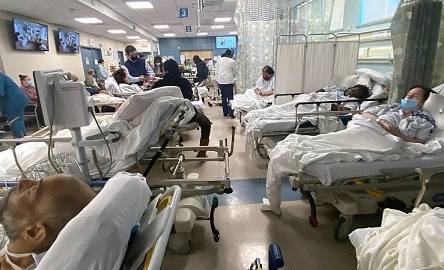COVID News: Hospitals And Emergency Rooms In United States Could Be Forced To Ration Care By The End Of December Due To Rising JN.1 And Flu Infections!
Nikhil Prasad Fact checked by:Thailand Medical News Team Dec 16, 2023 1 year, 4 months, 4 days, 7 hours, 25 minutes ago
COVID News: The United States stands on the precipice of a healthcare crisis as a confluence of factors, including a surge in COVID-19 cases, a spike in influenza infections, and the emergence of the JN.1 variant, threatens to overwhelm hospitals and emergency rooms. The U.S. Centers for Disease Control and Prevention (CDC) issued a dire warning, predicting that the healthcare system could be forced to ration care by the end of December.
https://www.cdc.gov/respiratory-viruses/whats-new/get-vaccinated.html
 Hospitals In the Mid-West Of America Simply Have No Hospitals beds At The Moment!
Hospitals In the Mid-West Of America Simply Have No Hospitals beds At The Moment!
A detailed examination of the current situation covered in this
COVID-19 News report, reveals a complex interplay of factors that demand urgent attention and strategic interventions.
The U.S. CDC's weekly update sounded the alarm on the rapid escalation of COVID-19 hospitalizations, with a particular focus on the rise in multisystem inflammatory syndrome in children (MIS-C), an alarming consequence of COVID-19 infection.
https://covid.cdc.gov/covid-data-tracker/#hospital-capacity
Simultaneously, influenza activity is surging across the nation, and respiratory syncytial virus (RSV) remains a persistent threat in many regions. The burden on pediatric hospitals is intensifying, with bed occupancy levels nearly matching those of the previous year in some areas.
Emergency room visits for school-age children have witnessed an alarming doubling, primarily driven by an acceleration in flu cases.
https://www.cdc.gov/ncird/surveillance/respiratory-illnesses/
This surge follows a period of relative stability in emergency room figures leading up to Thanksgiving, underscoring the sudden and unpredictable nature of the current crisis. Notably, influenza-related emergency room visits are now surpassing COVID-19 visits for the first time in months across most age groups, excluding seniors.
Nursing homes, particularly in the Midwestern region, are grappling with a sharp increase in reported COVID-19 cases, surpassing rates observed during last year's peak. This surge in infections among vulnerable populations raises concerns about the adequacy of preventive measures and highlights the urgent need for targeted interventions in long-term care facilities.
JN.1 Causing Havoc Across the United States
At the heart of the current wave of infections is the emergence of the JN.1 variant, a descendant of the highly mutated BA.2.86 variant. The U.S. CDC estimates that JN.1 is responsible for about 1 in 5 new COVID-19 cases, marking it as the fastest-growing variant in the U.S.
The variant's rapid spread raises questions about
its transmissibility and its ability to evade the immune system.
The World Health Organization (WHO) has convened a panel of experts, concluding that while JN.1's changes do not warrant a revision to this season's vaccines, early data suggests a potential reduction in vaccine effectiveness against the variant. The U.S. CDC projects that JN.1 will continue to increase as a proportion of SARS-CoV-2 genomic sequences, posing a significant challenge to ongoing vaccination efforts.
Vaccination Issues
Despite the concerning rise in infections, the United States faces a substantial vaccination gap, posing a formidable hurdle in the fight against the current public health crisis. Data from insurance claims indicates that flu vaccinations in adults are trailing last year's levels by approximately 8 million doses. Furthermore, children's flu shot rates have declined by around 5 percentage points compared to the same period last year.
A recent stakeholder meeting with the U.S. CDC revealed the acknowledgment from vaccine manufacturers that covering the missed vaccination volume is challenging, if not impossible. This drop in vaccination rates poses a significant obstacle to achieving the necessary level of immunity to curb the spread of respiratory viruses. The consequences of this gap in vaccination coverage are likely to be felt acutely as the healthcare system grapples with the surge in cases.
Health officials are sounding the alarm on the need for a renewed focus on COVID-19 vaccinations, especially among high-risk populations. In nursing homes, where the vulnerability is particularly high, only a third of residents and less than 10% of staff have received the current season's COVID-19 shot. The low uptake of vaccines, coupled with the rise in infections, paints a concerning picture of the potential for severe outcomes in these settings.
Hospitalizations In America Rising Exponentially
As hospitalizations continue to rise, the U.S.CDC warns of an impending healthcare crisis, exacerbated by the holiday season. New hospital admissions increased by 3% last week, surpassing 23,400 admissions for the week ending December 9. The combination of COVID-19, influenza, and RSV infections could strain the healthcare system to the point of necessitating the rationing of essential care, a dire scenario that demands urgent attention.
https://covid.cdc.gov/covid-data-tracker/#trends_weeklyhospitaladmissions_select_00
U.S. CDC Director Dr Mandy Cohen, speaking at an American Medical Association event, emphasized the severity of the situation and urged Americans to take the threat seriously. Cohen acknowledged the low uptake of vaccines for COVID-19, flu, and RSV, stressing the importance of vaccination to mitigate the impact of the surge in infections.
https://www.ama-assn.org/about/events/fireside-chat-cdc-director-ama-fall-winter-respiratory-virus-season
Despite the challenges posed by the JN.1 variant, the CDC reassures the public that, as of now, it does not appear to cause more severe disease than other circulating variants. The agency assesses that the strain does not present an increased public health risk relative to other variants, providing a glimmer of hope amidst the current crisis.
Conclusion
In conclusion, the United States finds itself at a critical juncture, navigating the complexities of a surge in COVID-19 and flu infections, compounded by the emergence of the JN.1 variant. Urgent and comprehensive efforts are imperative to address the vaccination gap, enhance healthcare capacity, and implement targeted interventions to mitigate the impact of the current crisis. The coming weeks will undoubtedly test the resilience of the healthcare system and the nation's ability to respond effectively to this multifaceted challenge.
For the latest
COVID-19 News, keep on logging to Thailand Medical News.
